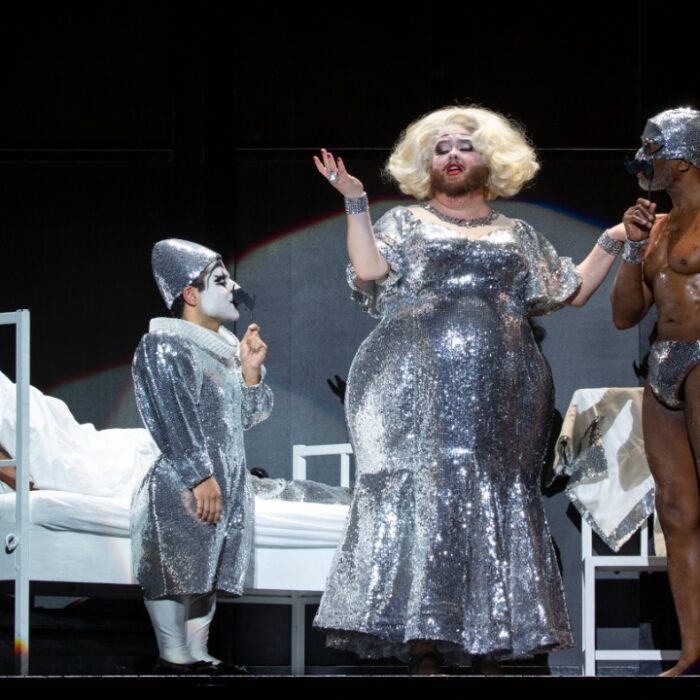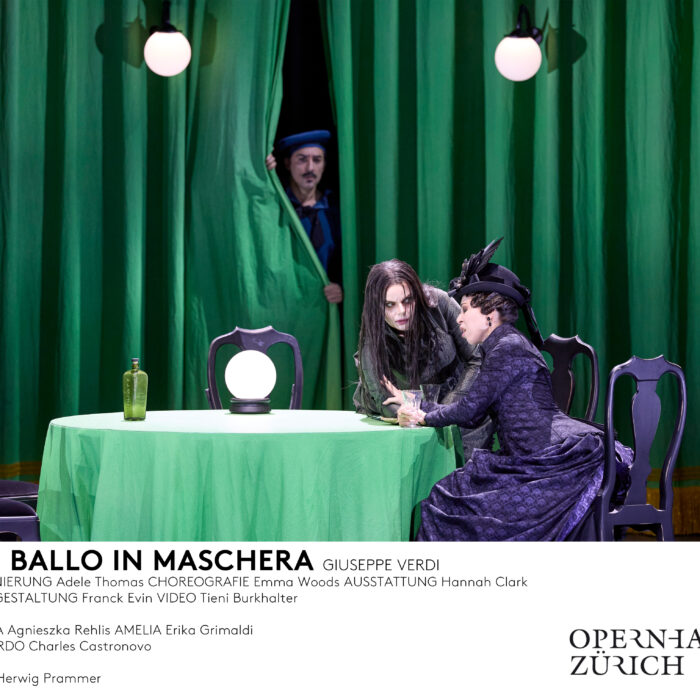
OrpheusPDX 2023 Review: Dark Sisters
By James Bash(Written by: James Bash)
OrpheusPDX, a new company founded by Christopher Mattaliano in Portland, Oregon, concluded its second season with a brilliant and thought-provoking production of Nico Muhly’s “Dark Sisters,” at Lincoln Hall on August 24. “Dark Sisters” explores and exposes relationships in a polygamous sect and reveals the courage of one sister-wife to leave it. With Stephen Karam’s libretto inspired by memoirs of women who have left the Fundamentalist Latter Day Saints (FLDS) and the 2008 raid of the YFZ Ranch by the FBI, “Dark Sisters” was delivered with spot-on directing by Kristine McIntyre and riveting performances by an exceptional cast.
The production – enhanced by lighting designed by Soloman Weisbard – opened with a large projected image of sun-bedecked mountains somewhere in the Southwest. On the right side of the stage was the edifice of a building made of plywood and the words “Pray and Obey” written vertically, as if on a pillar. The set, designed by Megan Wilkerson, evoked the isolated community of the cult where Eliza, one of the five sister-wives lived. A bed, inscribed with the words, “Keep Sweet and Sweeter” centered an intimate scene of tension between the Prophet – leader of the cult – and Eliza. Another domestic scene involving the wives, all of whom were dressed in pastel pioneer dresses designed by Lucy Wells, featured a sewing machine and the few things needed for one of the wives, who painted. The setting of the Larry King TV show simply offered a desk for King, a couple rows of chairs for the sister-wives, and a couple of cameras for the nationwide broadcast.
Soprano Lindsay Ohse superbly conveyed the role of Eliza, the one sister-wife who courageously leaves the cult. Ohse’s creamy voice turned edgy when she tried to question the Prophet and assert her individuality. She consistently struck just the right inflection that highlighted her predicament and generated a lot of sympathy for her character.
The other sister-wives readily circled wagons and chanted the mantra “Keep Sweet” when cracks in their world view arose. Vanessa Isiguen’s Almera was resolute in her devotion to the Prophet. Her soprano soared when she sang about the goal of getting to heaven, thrillingly topping out with the words “the kingdom will be ours.” But she also hinted at the restrictive community, and that death might be the only way out.
Matching her conviction was Emily Way as Zina and Sara Beaty as Presendia. Both women vied for the Prophet’s attention and traded catty remarks about who he would choose for the evening. Way’s lyric soprano deftly placed Zina in the moment: whether she was grateful for the new sewing machine that the Prophet purchased for her or frustrated because he rarely noticed her talents. Zina’s emotional state was triggered by Presendia, whose paintings were ignored by the Prophet. Beaty’s passionate mezzo, revealing Presendia’s undercurrent of anger, connected directly with the audience. They even briefly laughed when she tossed one of her art works on the floor.
Hannah Penn superbly expressed the doubt and conflicted personality of Ruth, who was castigated by the other wives for not being pure enough. That was their only explanation for the deaths of Ruth’s two young sons, even though one accidentally drowned and the other succumbed to an unspecified illness. With her rich mezzo, Penn mesmerizingly delivered the gravity of Ruth’s shaky mental state, and it was disturbing to see her character commit suicide.
With his chin jutting forward and a look of commanding self-righteousness, bass-baritone Nathan Stark brilliantly captured the firm and unshakable Prophet. He then turned the tables, and electrified the audience as the gruff and incredulous King, mugging to the camera while asking the women how many children they had and at what age they were married.
With an uncanny ability, Madeline Ross, embodied Lucinda, the teenage daughter of Eliza, who decides to remain with the cult and marry the man designated by the Prophet even though that man is 40 years older. Eliza pleads with Lucinda to leave the compound and try the outside world, but Lucinda rejects her mother’s offer and – underscored through Ross’s defiant voice and face – stays in the gated confines of the cult.
Deanna Tham, Assistant Director of the Oregon Symphony, made her operatic conducting debut with this production, deftly leading the chamber orchestra of thirteen musicians.
The ending dealt a crushing blow to Eliza’s hopes, but it did expose a facet of the human condition in which cults cement a bond with family ties and fearful religious views laced with threats. Muhly’s music expertly captured the story. The opening scene, for example, began optimistically with bird-like phrases. An evening scene with the starry heavens projected in the background was accompanied by pointillistic music. The Larry King show pulsated with the rat-a-tat of a newsroom. The singers’ voices blended extremely well, which terrifically elevated the ensemble numbers.



